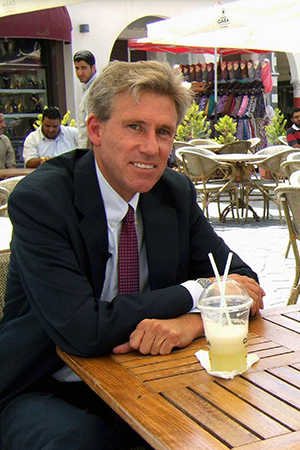U.S. Ambassador killed in Libya

In this July 4, 2012, file photograph, U.S Ambassador to Libya Chris Stevens is seen during an interview with a team of Libya Hurra TV. Stevens was killed in an attack on U.S. consulate in Benghazi, Libya, on September 11, 2012. Photo courtesy US Embassy in Libya via Balkis Press/Abaca Press/MCT.
September 13, 2012
BENGHAZI, Libya (AP) — A mob armed with guns and grenades launched a fiery attack on the U.S. Consulate, killing the U.S. ambassador to Libya and three other Americans. President Barack Obama strongly condemned the violence, vowed Wednesday to bring the killers to justice and tightened security at diplomatic posts around the world.
The attack that killed Ambassador Chris Stevens — the first U.S. ambassador to die in the line of duty since 1979 — came on Tuesday’s 11th anniversary of the Sept. 11 terrorist strike and presented a new foreign policy crisis for the United States in a region trying to recover from months of upheaval.
While the deadly assault was initially blamed on an anti-Islamic YouTube video, U.S. officials say the Obama administration is also investigating whether it was a planned terrorist strike to mark the anniversary of 9/11. Intelligence officials said the attack on the Benghazi consulate was too coordinated or professional to be spontaneous, according to a U.S. counterterrorism official who spoke on condition of anonymity because he was not authorized to discuss the incident publicly.
Libya’s interim president, Mohammed el-Megarif, apologized for what he called the “cowardly” assault on the consulate, which also killed several Libyan security guards in the eastern city.
Stevens, 52, died as he and a group of embassy employees went to the consulate to try to evacuate staff during the attack late Tuesday by a mob of protesters, including gunmen armed with machine guns and rocket-propelled grenade, attacked.
The crowd, which numbered several thousand strong, moved on the consulate, firing in the air outside the compound. The consulate is a one-story villa located in a fenced garden in downtown Benghazi. A small contingent of Libyan security forces protecting the facility also fired in the air, trying to intimidate them, said Wanis el-Sharef, the deputy interior minister of Libya’s eastern region.
But faced with the mob’s superior size and firepower, the Libyan security withdrew, el-Sharef said. Gunmen stormed the building, looted its contents and torch it, he said.
By the end of the assault, much of the building was burned out and trashed.
Al-Sharef said Stevens and a consulate staffer who had stayed behind in the building were killed in the initial attack on the consulate.
The rest of the staff successfully evacuated to another building nearby, preparing to move to Benghazi Airport after daybreak to fly to the capital, Tripoli, he said.
Hours after the storming of the consulate, a separate group of gunmen attacked the other building, opening fire on the more than 30 Americans and Libyans inside. Two more Americans were killed and 32 wounded — 14 Americans and 18 Libyans, he said.
There was no immediate confirmation of al-Sharef’s account.
Dr. Ziad Abu Zeid, who treated Stevens, told The Associated Press that he died of asphyxiation, apparently from smoke. In a sign of the chaos during the attack, Stevens was brought by Libyans to the Benghazi Medical Center with no other Americans, and no one at the facility knew who he was, Abu Zeid said.
Stevens was practically dead when he arrived before 1 a.m. Wednesday, and “we tried to revive him for an hour and a half, but with no success,” Abu Zeid said. The ambassador was bleeding in his stomach because of the asphyxiation but had no other injuries, he said.
“I strongly condemn the outrageous attack on our diplomatic facility in Benghazi,” Obama said in Washington, adding the four Americans “exemplified America’s commitment to freedom, justice, and partnership with nations and people around the globe.”
























